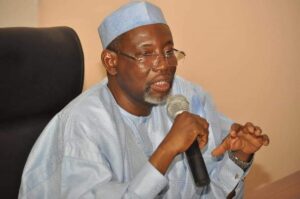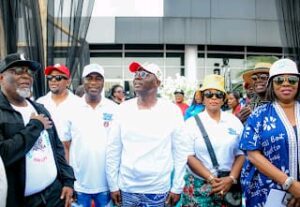National Boundary Commission resolves 15 interstate boundary disputes in 2023 – DG
The National Boundary Commission (NBC), says it has achieved significant results in the resolution of 15 boundary disputes in 2023.
Its Director-General, Mr Adamu Adaji, stated this during the Commission’s 2023 end-of-year media parley, on Thursday in Abuja.
Adaji said that the commission has intensified efforts in the resolution and definition processes on eight interstate boundaries.
The Commission, he said, also conducted field investigations and demarcation of seven interstate boundaries, including boundaries of the Federal Capital Territory with its neighbours.
He equally said the NBC provided some infrastructural facilities, such as market stalls and motorised boreholes along corridors of some interstate boundaries to promote trans-border cooperation and integration for peaceful coexistence.
On the Nigeria-Cameroon boundary dispute, the DG said the commission continued works on the International Court of Justice decided international boundary under the auspices of the Cameroon-Nigeria Mixed Commission.
He said that a total of 2,214 pillars have so far been emplaced along the boundary in series of contracts awarded as Lots with the last one concluded in 2022 as the Lot 7.
Adaji said the commission had conducted sensitisation campaign along the Borno State Sector, preparatory to the execution of Lot 8 contract expected to commence in February, 2024.
“With respect to the Nigeria-Benin international boundary, the commission, in liaison with our Beninese counterpart resuscitated the long-stalemated work with investigations along the Adjara River and the Igbokofi/Towe sectors of the boundary corresponding to Ogun State axis of Nigeria.
“Additionally, we organised a cross border cooperation activity in the form of a joint cultural and sporting activity amongst the communities of Baruten LGA of Nigeria and the corresponding Nikki Region of Nigeria and Benin, respectively.
“This is intended to downplay the weight of the border and create integration of the people who are the same but only separated by the colonially imposed international boundary.
“With respect to the Nigeria-Niger, the commission in liaison with our Nigerien counterpart under the auspices of the Joint Standing Committee carried out reconnaissance exercises to recover all the pillars placed between 1906 and 1908.
“We negotiated and replaced all pillars that were missing and reconstructed those that have deteriorated,” he said.
The NBC boss said that so far, a total of 128 main pillars out of the 148 inherited pillars have been reconstructed along the axis.
He added that 739 intermediate pillars have been constructed so far along the Nigeria-Niger boundary.
Adaji said that a platform was established for local border authorities and traditional rulers in the border states along Nigeria, Niger, and Cameroon international boundaries.
“This is for the attainment of peaceful co-existence between Nigeria and her proximate neighbours and facilitates cross border cooperation and regional integration,” he said.
Another achievement in the outgoing year, according to the DG, is the deposition of the African Union Convention on Cross-Border Cooperation at African Union Headquarters in Addis Ababa, Ethiopia.
The development, he said, placed Nigeria as the 9th of the 55 African to deposit the convention.
He said that these modest achievements in 2023 were recorded despite apparent challenges.
He identified some of the challenges as the uncooperative attitudes of some border communities, lack of proper sensitisation, misconception of the essence of boundaries, negative influences of elites, limited resources, among others.
“Our business is the management of Nigeria’s boundaries that include the internal boundaries between communities, between the local government areas and between the states and the FCT.
“Our works also include the international land and maritime boundaries of Nigeria with our proximate neighbours.
“Our strategy with respect to the internal boundaries is focus on dispute prevention, dispute resolution, boundary definition and trans-border relation’s maintenance.
“These we pursue vigorously through searches for delimitation records, joint meetings of officials of the states and the Commission, joint field investigations, physical tracing and provisional demarcation on the ground.
“We also carry out joint sensitisation and enlightenment campaigns, ethnographic studies amongst border communities and advocacy visits to disputing communities among other activities,” he said.
At the international level, the DG said the commission’s activities were conducted in bilateral or multilateral arrangements with neighbouring nations and in some cases, with interventions of regional or international organisations.
He listed some of the international organisations to include the United Nations, ECOWAS, Nigeria Niger Joint Commission for Cooperation, among others.
According to Adaji, in 2024, the Commission will among other things make its six Zonal Liaison Offices more active to handle activities in the zone promptly.
He also said that the Commission equally encourage states and local government councils to establish functional Boundary Committees, engage in more fieldworks aimed at physical investigations and making the boundaries more visible on the ground.
“The Zonal Offices will also be strengthened to conduct more sensitisation in the forms of seminars, workshops and advocacy visits.
“They will be establishing platforms for local border authorities and traditional rulers in the border states along Nigeria’s international boundaries with respect to the Nigeria-Benin boundary,” he said.




